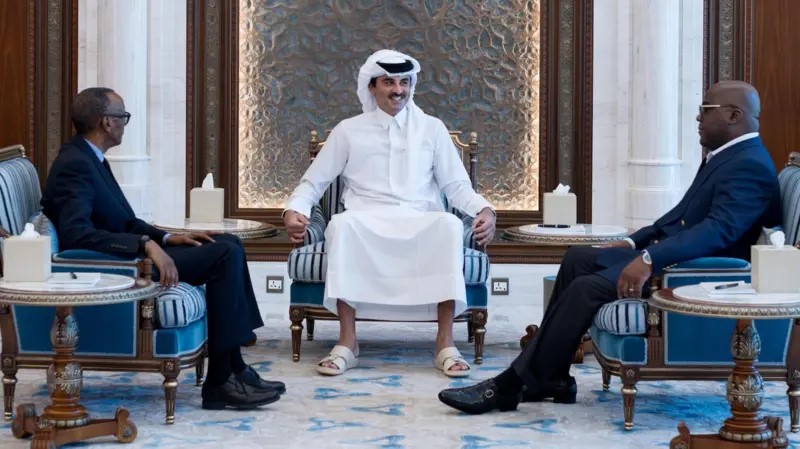Unexpected Meeting in Doha: Kagame and Tshisekedi Join Forces with Qatari Emir.
March 19, 2025

In an unexpected turn of events, Presidents Paul Kagame of Rwanda and Félix Tshisekedi of the Democratic Republic of the Congo (DRC) met in Doha, Qatar, on Tuesday. They were brought together by Qatar’s Emir, Sheikh Tamim bin Hamad Al Thani, with both leaders agreeing to continue their discussions on achieving lasting peace in the region, as confirmed by Qatar's Ministry of Foreign Affairs.
This meeting marks the first significant direct interaction between the two leaders since their last face-to-face encounter in September 2022 in New York, which was mediated by French President Emmanuel Macron. Since then, multiple attempts by international mediators to reignite peace talks have failed to produce meaningful results.
The Doha meeting highlights Qatar's growing diplomatic influence, particularly in African affairs. Qatar has played a key role in fostering dialogue between Rwanda and DRC, with both nations expressing a shared interest in collaborating with Qatar to resolve their ongoing conflict.
Earlier this year, Qatar had attempted to bring together Presidents Tshisekedi and Kagame for talks in Doha, but those plans were unsuccessful. However, the recent meeting in Doha signals a renewed commitment by both leaders to engage in dialogue, especially following the call for immediate de-escalation made during last month's summit involving the East African Community (EAC) and the Southern African Development Community (SADC).
According to Qatar’s Ministry of Foreign Affairs, Kagame and Tshisekedi have agreed to pursue a "momentary calm," as requested in the recent joint EAC and SADC summit. The two leaders also committed to continuing peace efforts through the revised "Luanda/Nairobi Talks," which aim to address the ongoing conflict in eastern DRC.
The increasing involvement of countries like Qatar and Saudi Arabia in facilitating peace talks has raised questions about their growing role in global diplomacy, especially in Africa. This development is seen as part of a broader strategy to enhance their influence in resolving regional conflicts.
In related news, the international community has raised concerns about Rwanda's alleged support for the M23 rebel group, which has been active in eastern DRC. While Rwanda has not publicly confirmed or denied the accusations, the issue remains a significant barrier to peace efforts.
On the ground in DRC, fighting continues between M23 rebels and government forces in the Walikale territory. Recent reports suggest that clashes have intensified, further complicating efforts to stabilize the region.
Qatar’s Minister of State for Conflict Resolution, Dr. Mohammed Al-Khulaifi, reiterated that dialogue is the only viable solution for resolving the tensions between Rwanda and DRC. In a social media statement, Al-Khulaifi expressed Qatar’s commitment to continuing direct talks and supporting peace efforts.
Meanwhile, Angola, another key player in the peace process, announced that the planned talks between the M23 group and the Congolese government in Luanda had been postponed for "serious reasons." The M23 rebels had previously stated they would not participate in the talks, citing the imposition of sanctions on their leadership as an obstacle to peace efforts. Despite this setback, Angola remains committed to facilitating dialogue and achieving a lasting resolution to the conflict in eastern DRC.


